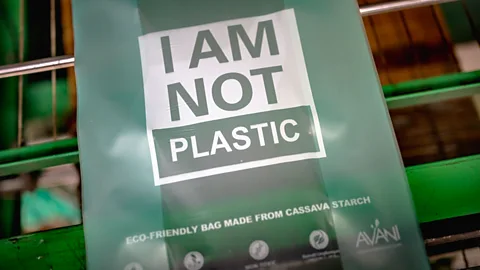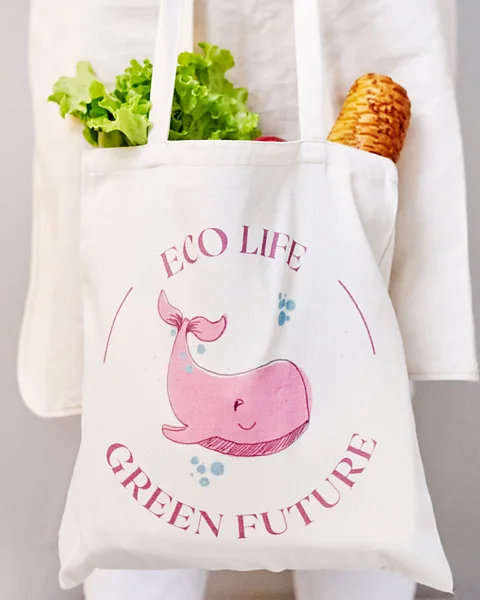Why 'bio' and 'green' don't mean what you think
 Getty Images
Getty ImagesThe language brands use to promote their environmental sustainability can be misleading and unverifiable. How do you spot a buzzword from a real claim?
Green. Bio. Natural. Clean. Organic. Eco-friendly. Sustainable.
These are words we are confronted with constantly: on billboards, online and on TV. They are pervasive in advertising and appear on the products we see on supermarket shelves. But what do they really mean and how do companies use them to convince environmentally conscious consumers to buy their products?
Rising public enthusiasm for climate action has led to a surge in corporate climate claims, making it increasingly difficult for consumers to distinguish between good environmental practices and misleading statements, a practice now referred to as "greenwashing".
The common denominator for all greenwashing is that it exploits a grey zone – it's misleading, but it can be true, according to Peter Seele, a professor in corporate social responsibility and business ethics at the Università della Svizzera italiana in Switzerland.
"That's the tricky part of greenwashing and why companies get away with it," he says.
COMING CLEAN
In Coming Clean, BBC Future uncovers the tricks and misdirections that we should all look out for when we see claims about sustainability.
In a previous article in the series, Isabelle Gerretsen reported on the adverts that were banned for misleading climate claims. But not all misdirections are so clear. Sometimes companies use environmental buzzwords which, while not innaccurate, give a misleading or unverifiable sense of sustainability. In this article, we explain why this language is so convicing.
Greenwashing is rampant in online marketing, according to a study by the European Union and national consumer protection authorities. It found many environmental claims on companies' websites are exaggerated, false and potentially illegal. In an analysis of online traders last year, the EU Commission assessed 344 "seemingly dubious claims" and found that in 42% of cases national authorities had reason to believe the claim was false, deceptive or could potentially qualify as unfair commercial practices under EU rules.
Vague language is a common telltale sign of greenwashing, says Seele. Brands will use vague buzzwords such as "green", "sustainable" or "eco-friendly" to make their business seem environmentally conscious, but without substantiation, they "don't mean much in themselves", he says. "There's no ultimate definition of what sustainability is. It's an empty word."
Another trend is companies linking sustainability to other issues that consumers care about, such as personal health. "The term 'healthy' can very easily be attached to 'planet', 'people' and 'lifestyle'," says Sarah Duncan, a sustainability consultant and author of the Ethical Business Book. The food and cosmetics industry use words like "clean", "pure" and "natural" to portray their products as being both good for the planet and people's health, she says.
 Getty Images
Getty ImagesGreenwashing is pervasive in the fashion industry, too. According to a report by the campaign group Changing Markets Foundation, 59% of environmental claims made by European fashion brands, including Zara and H&M, are unsubstantiated or misleading to consumers and flouted guidelines set by the UK's Competition and Markets Authority (CMA). The claims were evaluated against official CMA guidelines on climate claims and independently verified by the Changing Markets Foundation. The CMA’s guidelines include criteria such as that claims must reflect the whole life cycle of the brand, product, business or service and durability and disposability information must be clearly explained and labeled.
Zara and H&M were approached for comment. A spokesperson for Zara says "[the report] has noted that Zara was the most comprehensive at substantiating and ing its sustainability claims, and that it clearly communicates material characteristics across its main collections". At time of publication, H&M had not replied.
Brands are eager to highlight the sustainability of the materials in their clothes, and will frequently use words such as "organic", "natural", "recyclable" or "recycled", says Sigal Segev, associate professor of advertising at Florida International University.
"People tend to confuse organic with environmentally friendly," she says. "Maybe they don't use pesticides when they grow the cotton, but what happens next? There are so many phases in the product life cycle – what happens after you harvest the cotton and process it">window._taboola = window._taboola || []; _taboola.push({ mode: 'alternating-thumbnails-a', container: 'taboola-below-article', placement: 'Below Article', target_type: 'mix' });
